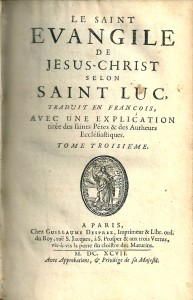Our weekly market visit took us to Guingamp this morning. It was cloudy but fairly warm compared to last week. We set up in our usual space and stood in the cold. I was quietly praying that I would have at least one conversation with someone.
It wasn’t long before a young woman walked past me. She turned around and started talking to me about the pastor of the church. It took me a few seconds to realise she was in actual fact talking about the former pastor (and still elder with us), Claude Broux.
Here’s her story: Sandrine (that’s her name), is from Pabu, the village touching Guingamp (the village where we live). She went to high school in Guingamp town center. While she was in high school, she met Claude Broux who, at the time, had a stand on the market. He gave her the Bible and prayed for her. Later, while reading her Bible, she was converted. She’s remained in the catholic church but she was grateful for that day when she was given the Word of God and met Jesus as a result. She wants to thank Claude Broux and said she’d write to him. My suggestion to her was that she would come to one of  our services instead and thank him herself. I pray that this is what she will do.
Her encouragement to me was that the work we are doing is worth it. I was indeed excited and thank God for answering our prayers and giving me this conversation.

 The oldest book on my shelves is a French gospel of Luke. It is dated 1697. I think it is a Roman Catholic translation, with both latin and French in two columns, and comments from the church fathers. Inside the cover is a handwritten note with my grandfather’s name, Paris, 1929. I suppose that’s when he bought it, when he was living in Paris as a young man (he was 20 years old).
The oldest book on my shelves is a French gospel of Luke. It is dated 1697. I think it is a Roman Catholic translation, with both latin and French in two columns, and comments from the church fathers. Inside the cover is a handwritten note with my grandfather’s name, Paris, 1929. I suppose that’s when he bought it, when he was living in Paris as a young man (he was 20 years old).